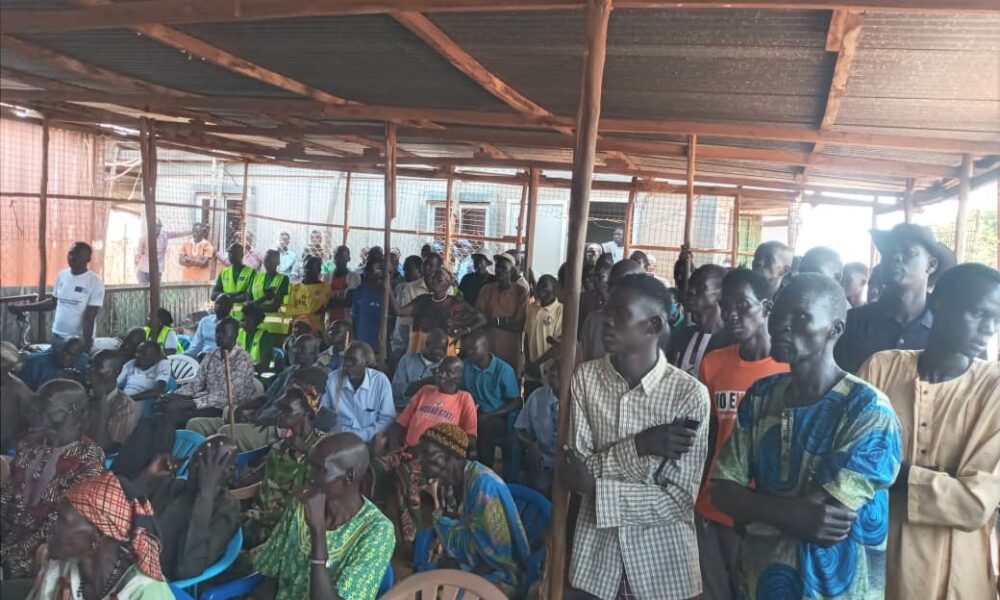By Yiep Joseph
Internally Displaced Persons (IDPs) at Protection of Civilians (POC) site in Juba decried alarming insecurity and hunger since the government took over the facility.
In 2020 the UN Protection of Civilians (POC) site in Juba was redesignated into temporary camps for internally displaced persons (IDPs) under the sovereign protection of the Government of South Sudan.
However, after the United Nations Mission in South Sudan (UNMISS) handed over the camp to the South Sudan government, the IDPs grumble that the situation have never been better.
After the takeover, South Sudan government was tasked to ensure security in the facility, as well as provide basic needs on the process of integrating the IDPs into the communities.
However, since the takeover, residents claimed that little has been made by the government while insecurity and hunger continue to increase.
During a visit by the Central Equatoria State government on Friday, Elijah Hon, chairman of the IDP camp in Juba, expressed deep concern over escalating insecurity.
He stated that the camp, currently sheltering over 38,000 displaced persons, is struggling with rising incidents of armed robbery and severe hunger.
These challenges, Hon said, have created a climate of fear and suffering among the camp residents.
Tot Both Dayien, a member of the Community Watch Group and a youth representative within the former Protection of Civilians (POC) site, reported that insecurity and hunger have continued to worsen since the government assumed responsibility for the site.
“When we were under UNMISS, POC was very quiet, but after the government took it over from 2020 up to now, we are living worse lives in POC insecurity, and hunger continues to alarm us,” Tot said.
“During the nighttime, we do not sleep because of insecurity; we can see people in uniform, and we can see people in non-uniform with guns. We do not know where they come from,” he added.
He appealed to the government to trace out those who may have ill plans against the people in the IDP camp, adding that those in IDP are not part of the politics.
“We are suffering and crying to the government of South Sudan. When the youth are leaving here in POC, we are nonpartisan. We are the citizens of South Sudan, but we do not know why the government of South Sudan turns itself to kill its citizens,” he added.
He added that the cases of robbery in the POC continue to persist with many people losing their property.
“The guns continue to cry in POC with many people being looted at night and even during the day,” he said.
Tot revealed that more than twenty incidents of robbery have been reported in recent months while necessary gunshots continue to be the order of the day in the camp.
He urged the visiting team of the Central Equatoria state to inform the national government to take measures toward insecurity in the camp.
“We face many challenges; we do not know where they come from, and when the government is in control of the POC, why are the guns inside?” he said.
“The government should search where the problem and guns come from. Is it from criminals or where? he questioned.
He added that besides insecurity, the camp lacks inadequate clean water and a proper health care system.
“When the government took over the POC, it cut our food. We do not have food to eat, whereby we just struggle doing whatever jobs and hustles to get food,” he added.
He added that the IDP leadership has made several attempts to approach the government to bring stability to the area.
“We also reach out to the government to bring security, but it has not responded up to now,” he added.
In his Philip Pidok Paramount Chief of sixteen counties court, in the IDP, reiterated the need for the government to provide security and food assistance in the camp.
Meanwhile, in his response to the decry of the IDPs, Paulino Lukudu, CES deputy government, who headed the delegation on the garbage collection campaign, expressed government’s commitment to solving issues facing IDPs.
He emphasized the need for the IDPs to embrace unity as well as cleanup activities to keep a healthy environment.




